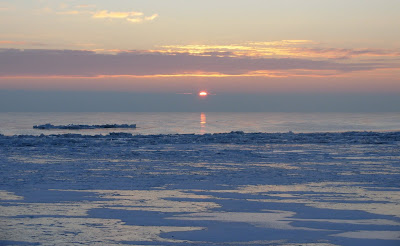Enjoy...









Here's an example of the pressure-induced ice ranges I talked about in my post from a few days back. To give you a sense of scale, that lethal looking peak on the right must have been close to 3 feet tall.
 I'm currently reading a book about Ernest Shackleton's ill-fated trans-Antarctic attempt begun in 1914. After his ship, the Endurance, was trapped and ultimately destroyed in the ice floes of the Weddell Sea, the group of men spent over a year camped out on top of the sea ice waiting for it to either break up and allow passage by boat, or carry them close enough to land to make a run for it over the ice. Can you imagine...they WINTERED in Antarctica...camped in little canvas tents atop a floating mass of sea ice...their boots were made of felt!
I'm currently reading a book about Ernest Shackleton's ill-fated trans-Antarctic attempt begun in 1914. After his ship, the Endurance, was trapped and ultimately destroyed in the ice floes of the Weddell Sea, the group of men spent over a year camped out on top of the sea ice waiting for it to either break up and allow passage by boat, or carry them close enough to land to make a run for it over the ice. Can you imagine...they WINTERED in Antarctica...camped in little canvas tents atop a floating mass of sea ice...their boots were made of felt! Anyway, at this point in the story it's mid April and the ice pack is breaking up. The floe cracked underneath their tents during the night and sent one of the party into the sea while still curled up in his sleeping bag (he survived by running around the remaining ice chunk until his frozen clothing dried out). Shackleton then made the decision that ice-top camping was no longer safe and ordered everyone to pile into three rafts and set out across the still heavily icy water. This is where things start to get really bad. Imagine trying to navigate around a broken ice pack rising up to 5 feet above the water. These immense chunks occasionally collide raising ice ranges stories tall and crushing anything that happens to be in their way. The ocean swells are so large that, when separated, each boat is hidden from the other behind huge rolling hills of water.
This morning while gazing at the knife-edge shards of broken ice uplifted above the surface of Lake Michigan, I tried to scale up the scene and imagine the dire intensity of Shackleton's travails. I heard about this book (Endurance by Alfred Lansing) on NPR as part of a segment recommending good reads for grad students. Their rationale was that while struggling through the worst of your studies, you could pause for a moment and think, "well, I guess things could be worse."
Indeed.
Yes, indeed, things could always be worse. But things can also be better, so I'll hope for better!! I, too have had reason to be glad. I said NO to a movie!!! I was torn but finally decided to do it and I'm really glad. The work that I would have missed out on would be enough to "pay the bills" and the stress that I AM missing out on is not going to happen. That's worth a PILE!!! LOVE YOU!!!!!!!!!!
ReplyDelete